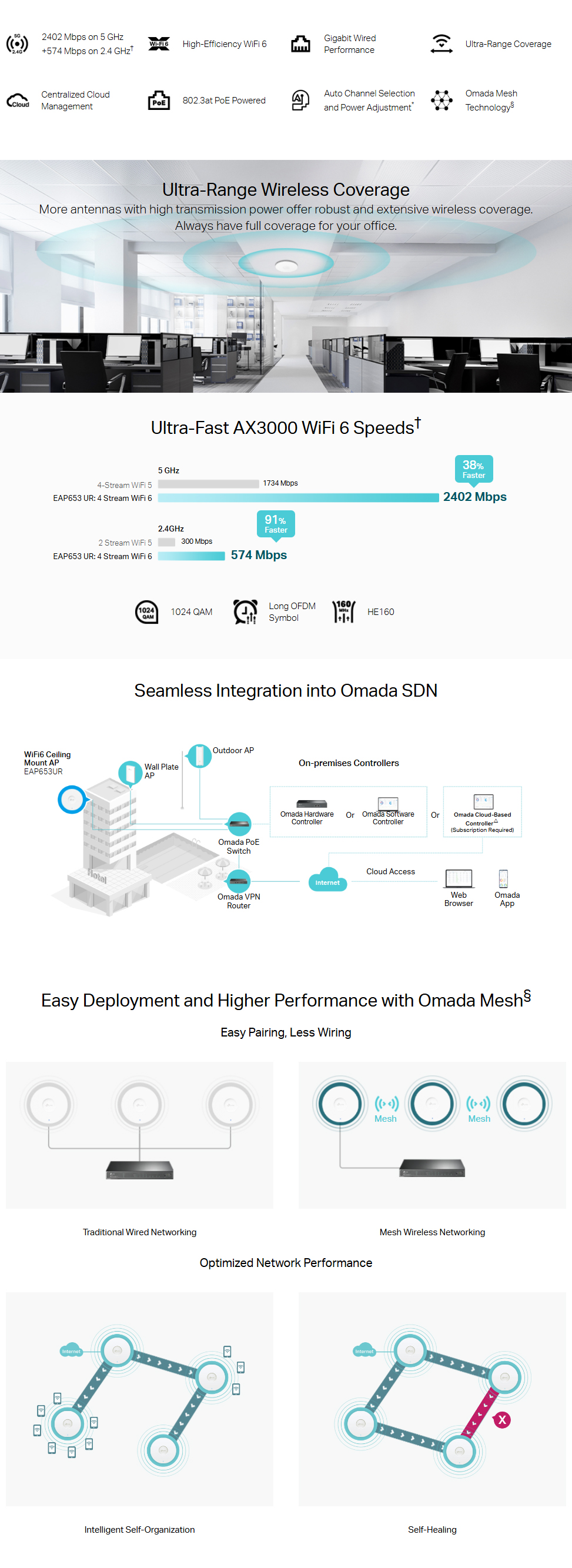Wireless Functions | • 1024-QAM • 4× Longer OFDM Symbol • OFDMA • Multiple SSIDs (Up to 16 SSIDs, 8 for each band) • Enable/Disable Wireless Radio • Automatic Channel Assignment • Transmit Power Control (Adjust Transmit Power on dBm) • QoS(WMM) • MU-MIMO(2G: 2*2 MU-MIMO DL/UL; 5G:2*2 MU-MIMO DL/UL) • HE160 (160 MHz Bandwidth) • Seamless Roaming(802.11k/v/r)§ • Omada Mesh§ • Band Steering • Load Balance • Airtime Fairness • Beamforming • Rate Limit • Reboot Schedule • Wireless Schedule • Wireless Statistics based on SSID/AP/Client |
Wireless Security | • Captive Portal Authentication§ • Access Control • Wireless Mac Address Filtering • Wireless Isolation Between Clients • SSID to VLAN Mapping • Rogue AP Detection • 802.1X Support • WPA-Personal/Enterprise, WPA2-Personal/Enterprise, WPA3-Personal/Enterprise |
Transmission Power | • CE: <20 dBm(2.4 GHz, EIRP) <23 dBm(5 GHz, Band1 & Band2, EIRP) <29 dBm(5 GHz, Band3, EIRP) • FCC: <26 dBm (2.4 GHz) <27 dBm (5 GHz) |
System Requirements | Microsoft Windows XP, Vista, Windows 7, Windows 8, Windows10, Windows 11, Linux |
Notes | Maximum wireless signal rates are the physical rates derived from IEEE Standard 802.11 specifications. Actual wireless data throughput and wireless coverage are not guaranteed and will vary as a result of 1) environmental factors, including building materials, physical objects, and obstacles, 2) network conditions, including local interference, volume and density of traffic, product location, network complexity, and network overhead, and 3) client limitations, including rated performance, location, connection, quality, and client condition. Use of WiFi 6 (802.11ax) and its features, including OFDMA, HE160, and 1024-QAM, require clients to support the corresponding features. The 160 MHz bandwidth is only available on the 5 GHz band. It may be unavailable in some regions/countries due to regulatory restrictions. The double channel width refers to 160 MHz compared to 80 MHz for general WiFi 6 APs. §Omada Mesh, Seamless Roaming, Captive Portal, and Cloud Access require the use of Omada SDN controllers. Go to https://www.tp-link.com/en/omada-mesh/product-list/ to find all the models supported by Omada mesh technology to find all the models supported by Omada mesh technology, and refer to the User Guides of Omada SDN controllers for configuration methods. *Zero-Touch Provisioning and Auto Channel Selection and Power Adjustment require the use of Omada Cloud-Based Controller. Go to https://www.tp-link.com/en/omada-cloud-based-controller/product-list/ to confirm which models are compatible with Omada Cloud-Based Controller. **The actual capacity depends on the wireless environment and client traffic and is generally less than the maximum number of client connections. ***Coverage value is calculated based on laboratory testing. Actual coverage is not guaranteed and will vary as a result of client limitations and environmental factors. |




